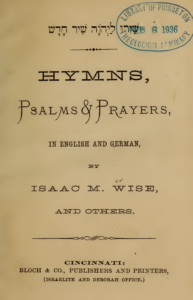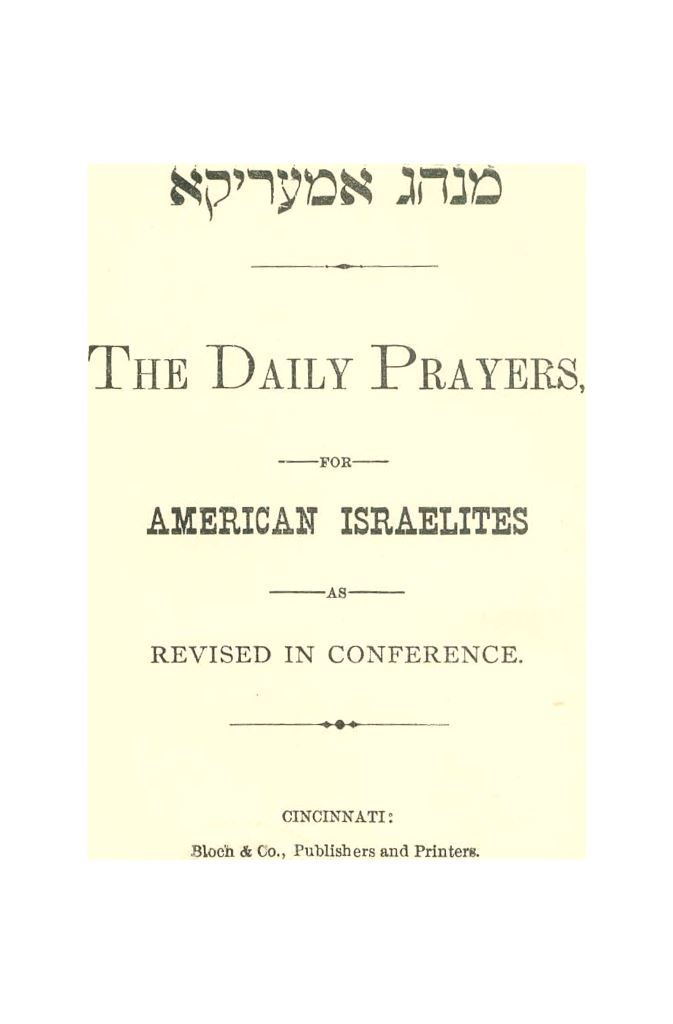
With the present volume, the author concludes his labor for the Minhag America, i.e. the Liturgy of American Israelites. It is his ardent wish, that the main portion of the synagogal liturgy shall remain in Hebrew — the Maarib, Shacharith, Mussaph for Sabbaths, New Moons and Holidays, and the Minchah, as corrected and abridged in the Hebrew portions of the Minhag America books; since he can not see any valid reason for the abolition of those prayers. All Israel has these four divisions of divine service with the Neilah for the Day of Atonement, and this is an important inducement to their retention.
The Hebrew language in our public worship is the medium of our synagogal union. Dispersed as the house of Israel is in all lands, we must have a vehicle to understand each other in the house of God, so that no brother be a stranger therein; and this vehicle is the Hebrew. Aside from this consideration, however, the Hebrew sounds are sacred to the Israelite; they are holy reminiscences of his youth, which can as little be replaced to him in another language, as the Psalms of David can be fullv reproduced in any other tongue. Those who are not at all conversant with the Hebrew, — and few among us are so entirely ignorant of the sacred language — can resort to translated prayer-books which will always enable them to follow the minister in the public worship. In the house of the Lord, let us always remain a unit, as our sires have been.
Still it must be admitted, that portions of our divine worship should be conducted in the vernacular of the country in which we live. There are several good reasons for this innovation. In the first place, we must give some satisfaction to those who are not at all conversant with the Hebrew. Our temples are often visited by Gentiles, to whom we owe some consideration, and by numerous persons of our own persuasion who prefer the vernacular of the country to the Hebrew. We owe them this concession. We must no longer hide our sublime doctrines and our sacred precepts; they must be expressed in clear and intelligible words, accessible to all. To this end, it is not sufficient to furnish mere translations; because our age, like every other, has its own sentiments, conceptions, hopes and wishes, which must be clearly expressed in public worship, to render it satisfactory to the devout Israelite. Therefore our sires had their own psalms, hymns and prayers in correspondence with every age. The Psalms of David were succeeded by the hymns and prayers of the Men of the Great Synod, then of the Rabbis of the Mishnah and the Talmud, then again by the numerous Piutim, Pizmonim, Selichoth, Kinoth, and various other forms of sacred poetry, for the Synagogue, at different times, to suit the religious demands of each. Why should we in our days not exercise the same privilege, when by the progress of time, sentiments and conceptions have changed so universally? In justice to our sacred cause, we must give expression to our religious feelings, hopes and wishes, in the language most accessible to all, and in the form most agreeable to our age.
The author opposes the promiscuous conglomeration of the Hebrew portions with those in the vernacular. He wishes to see the Hebrew uninterrupted by other pieces, in order not to disturb those who wish to read the prayers as they desire; and to leave the ancient divisions predominant and conspicuous. Therefore he places the vernacular hymns, psalms and prayers at the beginning and at the close of divine worship; before and during the unfolding of the divine law, commonly called the Aus-heben, which concludes the Shacharith portion; before and during the returning of the divine law to the ark commonly called Einheben; after the sermon, or in place thereof when none is preached; which begins the Mussaph. Thus the Hebrew portions stand prominently and conspicuously in the midst, which adds greatly to their solemnity and to devotion in general.
The choice of pieces for each public worship, of the vernacular as well as of the Hebrew, must be left to the judgment of the various congregations and their ministers, who must know to make the best selections for their respective purposes. One or more pieces may be selected for each division, and the Hebrew portion may be commenced with Lechu Nerannenah, or any other of the psalms, or with Kaddish and Borechu Baruch Sheomar, or with Nishmath; the Shacharith Kedushah may be omitted, the seven benedictions read entirely in silent devotion, and the minister only read aloud the Mussaph benedictions with the Kaddushah, and the congregation pray simultaneously with him. Each congregation and its minister must make the proper selections. But divine service, the sermon inclusive, on ordinary occasions, must never last longer than two hours, and nothing must be either read or sung in the temple, without being properly announced to the congregation, so that every body can find it in his book, nor must anything be announced which is not in the books of the congregation. As we do append a ritual to this volume, we shall say no more on the subject in this place.
All original pieces in this volume written by others than the author, are marked with their respective names. Pieces adopted from other collections are also properly noted. All other pieces are claimed by the author as his own productions. He knows of but one English hymn book, written and compiled for the Synagogue; it is that of the Hebrew congregation of Charleston, S.C., of which he possesses the second edition. The German Synagogue has several hymn books, like the Hamburg collection, the Johlsohn’s, the Wurtemberg and the Berlin, as also Leopold Stein’s productions and collections, from which several pieces were adopted. For us, in America, as far as the English language is spoken, it is especially necessary that gifted sons and daughters of Israel should adorn the temple with original hymns, as we are quite poor in this species of literature. The author hopes to give a fresh impulse to Hebrew genius, to enhance our sacred literature in the language of our country. He wishes heartily, that hereafter, rabbinical conferences or synods may decide on the worthiness of poetical productions, to be incorporated into our synagogal volumes; in absence thereof he can only submit his humble productions to the choice of the congregations and their respective ministers.
The author can not conclude this without duo acknowledgments to Mrs. Minna Kleeberg for her valuable German contributions to this work, and without expressing his gratification that a gifted daughter of Israel contributes excellent xpressions of piety to our sacred literature. He harbors but one wish, which is this: — May every soul be elevated to the throne of grace by the means of his words, and may the Lord God of Israel be pleased with his humble exertions in behalf of the religion taught by Closes and the prophets. The name of the Lord be glorified, now and forever.
THE AUTHOR.
Cincinnati, in the month of Adar,
5628, A.M.

“📖 תפלות בני ישורון (רפורמי) | Hymns, Psalms & Prayers in English and German, by Rabbi Isaac Mayer Wise, et al (Minhag America, 1868)” is shared through the Open Siddur Project with a Creative Commons Public Domain Dedication 1.0 Universal license.










Leave a Reply